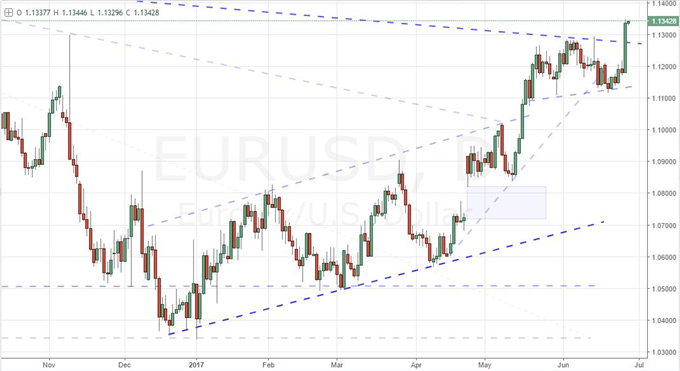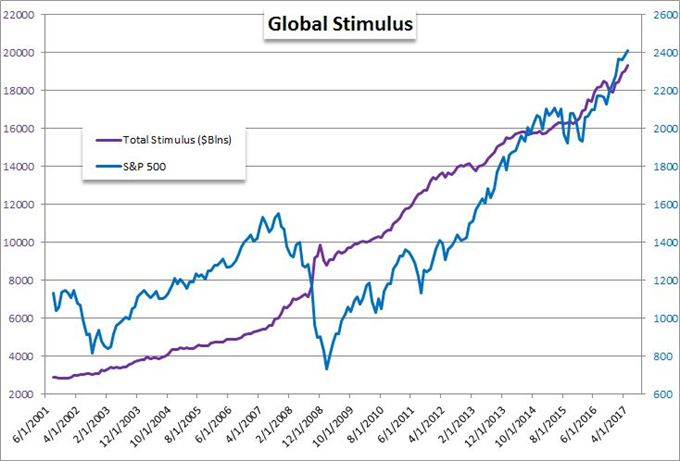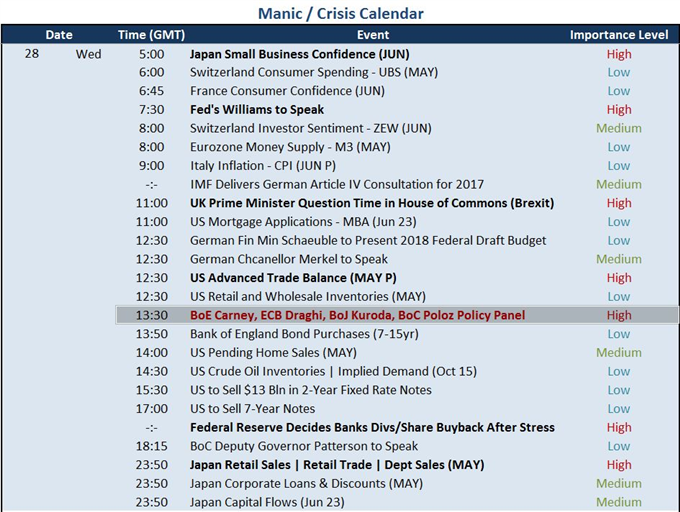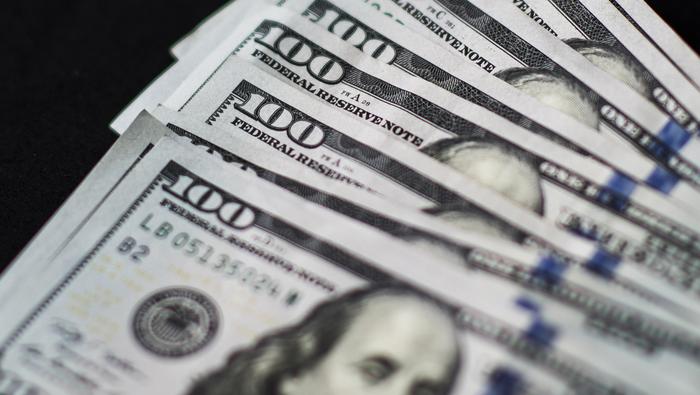Talking Points:
- Risk aversion gained dangerous traction through Tuesday's US session close with an equity tumble and VIX surge
- An IMF downgrade of US growth on fading Trump policy hopes seemed reinforced by a delayed Senate vote on healthcare
- The Dollar was driven lower as much by the broader market's risk concerns as any direct rate forecasts or local risks
How have retail traders changed their EUR/USD positions after the 1.1300 break? Is there speculation of a break or hold for oil at 44? Check out the IG speculative sentiment to see.
Assumptions of stable markets with a modest appetite for adding to risk amid the Summer Doldrums was shaken this past session. Not only were there strong tremors in the FX market with a dramatic bullish break from EUR/USD, but there was also a distinct risk aversion reaching broadly across the financial spectrum. While it is still difficult to foster a meaningful trend in these complacency shaped and liquidity harbored conditions, it is not impossible to establish a seismic shift if founded on sentiment itself. With recognition of that possibility in mind, we should analyze the events that motivated the slide in speculative assets this past session a little more closely.
In comparing what markets were affected by the wave of fear, time frame rather than asset class is the important delineation. Looking at assets in the Asian and European sessions Tuesday reveal little genuine concern. It wasn't until the afternoon hours of the New York session that the pain started to show through. And, it would show everywhere. US equities fell across the board with a particular intensity from the highest flying sector- technology, which leaves the favored FAANG acronym and Nasdaq Composite with worrying charts. Yet, speaking to the breadth of the sentiment shift; there was retreat for emerging market assets trading during the session, high yield, carry trade and even the Dollar. The Greenback's immediate future is tied inextricably to speculative appetite. That said, the fundamental burden placed on the currency this past session was intense. The IMF announced that it had downgraded its forecast for the US economy in 2017 (2.3 to 2.1 percent) and 2018 (2.5 to 2.1 percent) due to growing doubts that the popular political promises of regulation roll back, tax reform and infrastructure spending would be implemented. Given the market already looks as if it has priced in the developments, we are left with considerable deleveraging risk.
Seeming to give weight to the IMF's concerns, the Senate announced that it would delay its vote on the most recent go at replacement of the current healthcare regime - a hurdle that needs to be passed for any real discussion on tax policy. Finally, Fed Chair Janet Yellen added fuel to the fire by suggesting equities were 'somewhat rich' a remark that Dollar traders seemed more concerned with than her confidence in the current pace of monetary policy. Further, EUR/USD's best performance of the year and strong break of 1.1300 further showed that these risk-related motivations overrode concern related to Germany's evaluation that low rates was the greatest financial risk the country faces - though Draghi's remarks about willingness to tweak policy helped. Neither the UK's nor Japan's financial evaluations offered optimism. The BoJ said business and consumers were building up savings rather than turning funds back into the economy. The BoE said external and local risks necessitated banks increasing their capital buffers by 11.4 billion pound. With the disappointing collective financial stress assessment, we heading into Wednesday's session looking for policy statements from the world's most dovish, large central banks. Will the ECB, BoE, BoJ and BoC take this opportunity to turn the corner themselves - and potentially solidify the need to deleverage risk? We discuss the heavy market moves and their potential in today's Trading Video.
To receive John’s analysis directly via email, please SIGN UP HERE.









